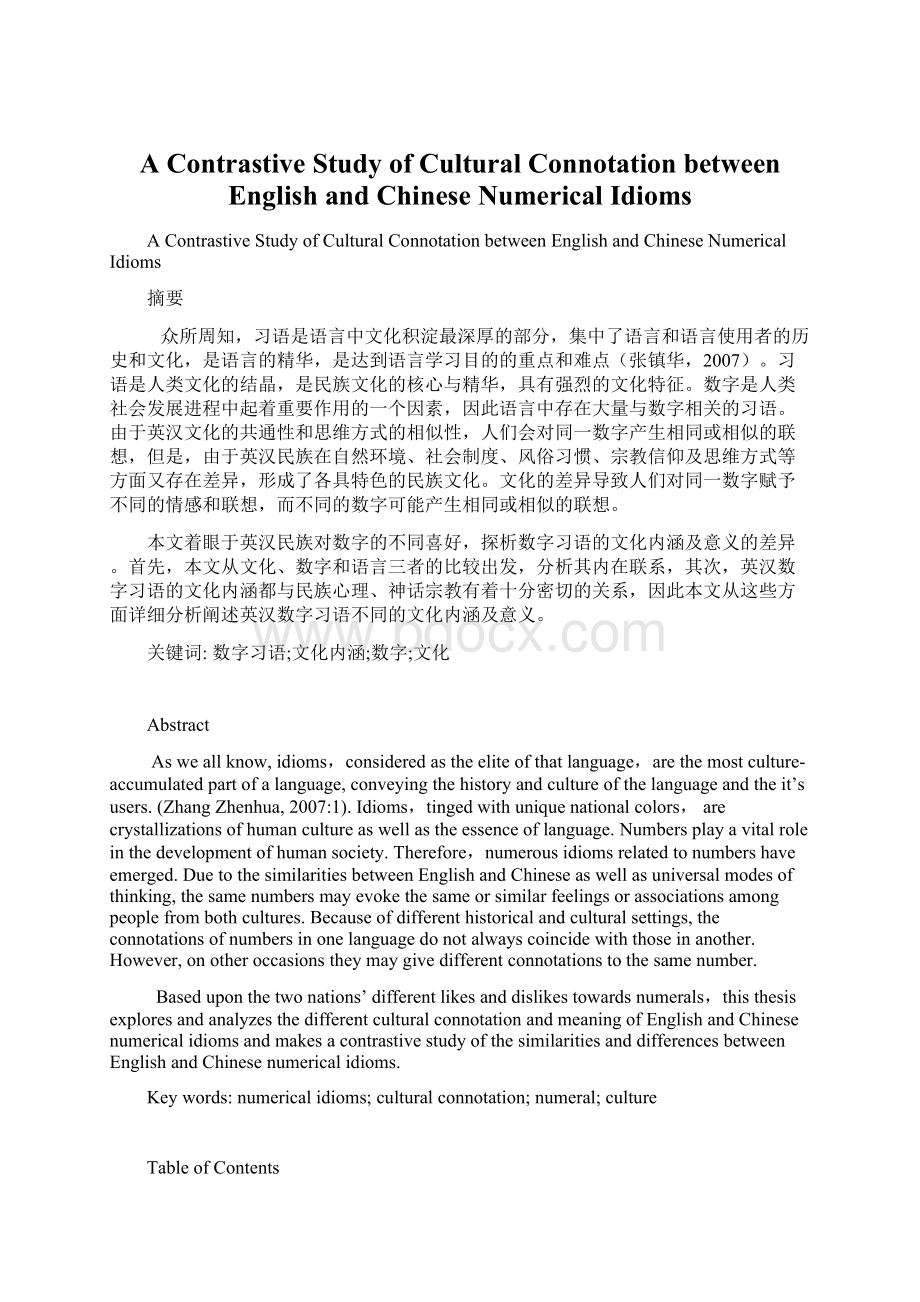A Contrastive Study of Cultural Connotation between English and Chinese Numerical Idioms文档格式.docx
《A Contrastive Study of Cultural Connotation between English and Chinese Numerical Idioms文档格式.docx》由会员分享,可在线阅读,更多相关《A Contrastive Study of Cultural Connotation between English and Chinese Numerical Idioms文档格式.docx(8页珍藏版)》请在冰豆网上搜索。

本文着眼于英汉民族对数字的不同喜好,探析数字习语的文化内涵及意义的差异。
首先,本文从文化、数字和语言三者的比较出发,分析其内在联系,其次,英汉数字习语的文化内涵都与民族心理、神话宗教有着十分密切的关系,因此本文从这些方面详细分析阐述英汉数字习语不同的文化内涵及意义。
关键词:
数字习语;
文化内涵;
数字;
文化
Abstract
Asweallknow,idioms,consideredastheeliteofthatlanguage,arethemostculture-accumulatedpartofalanguage,conveyingthehistoryandcultureofthelanguageandtheit’susers.(ZhangZhenhua,2007:
1).Idioms,tingedwithuniquenationalcolors,arecrystallizationsofhumancultureaswellastheessenceoflanguage.Numbersplayavitalroleinthedevelopmentofhumansociety.Therefore,numerousidiomsrelatedtonumbershaveemerged.DuetothesimilaritiesbetweenEnglishandChineseaswellasuniversalmodesofthinking,thesamenumbersmayevokethesameorsimilarfeelingsorassociationsamongpeoplefrombothcultures.Becauseofdifferenthistoricalandculturalsettings,theconnotationsofnumbersinonelanguagedonotalwayscoincidewiththoseinanother.However,onotheroccasionstheymaygivedifferentconnotationstothesamenumber.
Baseduponthetwonations’differentlikesanddislikestowardsnumerals,thisthesisexploresandanalyzesthedifferentculturalconnotationandmeaningofEnglishandChinesenumericalidiomsandmakesacontrastivestudyofthesimilaritiesanddifferencesbetweenEnglishandChinesenumericalidioms.
Keywords:
numericalidioms;
culturalconnotation;
numeral;
culture
TableofContents
1.Introduction
AsanimportantpartoftheEnglishandChineseidioms,numericalidiomsreflectthepsychologicalbases,thetraditionsandcharacteristicsofbothcultures.AgoodunderstandingoftheculturalconnotationsofthenumericalwordsisthebasisfortheproperuseofEnglishandChinesenumericalidioms.Itwillhelpuswithlanguageteachingandlearningaswellcross-culturecommunicationifwehaveaproperunderstandingofthedifferencebetweentheEnglishandChinesenumericalidioms.(ChangRunfang,2008.)
Sofar,manyscholarshavemadesystematiccomparisonbetweenEnglishandChineseidioms.Numericalculturehasattractedscholars’attentionathomeandabroadinrecentdecades,especiallyinChina.Astheglobalizationoftheworldisspeedingupdayafterday,andChinesenumeralscarrysuchrichculturalmessages,itisnecessarytointroducetherichChinesenumericalculturetoforeigncountriesandviceversa.
ThisthesisdiscussesthedifferentculturalconnotationsofbasicnumeralsinbothEnglishandChinesefromtheperspectiveofpsychology,mythologyandreligion.Itcontainsfivechapters.
2.Numbers,languageandculture
2.1Therelationshipbetweencultureandlanguage
Inabroadsense,culturereferstothetotalityofmaterialandspiritualproductscreatedbyhumanbeingsintheirpractice.Specificallyspeaking,itcanbedividedintomaterialculture,institutionalcultureandpsychologicalculture.Inanarrowsense,culturerefersmerelytospiritualproductsincludinglanguage,literature,art,socialideology,etc.Definitionof
culturehasvariedagreatdealsincetheemergenceofanthropologyinthe19thcenturyandnounanimityhasbeenreachedyet.(Wangzhikui,2001:
23)
Languageandcultureareinseparablefromeachother.Language,ononehand,isthecarrierofculture,ontheotherhand,anecessarypartofit.Anyculturemustbeexpressedinacertainlanguage.
2.2Therolesplayedbynumbersinbothlanguages
Whenhumanthoughtdevelopedtoacertaindegree,numberscameonthesensetomeettheneedofthesocialactivitieswiththehelpofsigns.Numbersareusedforcounting,comparingamounts,performingcalculations,determiningorder,makingmeasurements,representingvalue,settinglimits,abstractingquantities,codinginformation,andtransmittingdata.Everynationhasnecessitytousenumbersintheircountingsystems.Numbersisanorganicpartoflanguage.
Numericalwordswiththeiruniqueconnotationsandfunctionsplayaveryimportantroleinhuman'
sculturalcommunicationanddevelopment.BecauseofthesimilaritiesbetweenEnglishandChineseculturesandmodesofthinking,thesamenumbermayevokethesameorsimilarfeelingsorassociationsamongpeople.However,duetodifferenthistoricalandculturalsettings,theconnotationsofnumbersinonelanguagedonotalwayscoincidewiththoseinanother.Insomecasespeoplemayusedifferentnumberstoexpressthesamefeelingsorfigurativemeanings,whileonotheroccasionstheymaygivedifferentfeelingsorfigurativemeaningstothesamenumber.
3.AbriefanalysisofEnglishandChinesenumericalidioms
3.1Thedefinitionofidiominbothlanguages
It’sbynomeanseasytogiveaclear-cutdefinitionofidioms.Thedefinitionscandifferfrompersontoperson(expertsandscholars)andfromdictionarytodictionary.
AccordingtoLongmanDictionaryofContemporaryEnglish,(2004:
971)anidiomisagroupofwordswithameaningofitsownthatisdifferentfromthemeaningsofeachseparatewordputtogether.Forexample“undertheweather”isanidiommeaning“ill”.
Dictionariesofferverydifferentopinions,sodoexpertsandscholars.Toquoteonlytwoofthemasexample:
Ammer(1997)definesanidiomasasetphraseoftwoormorewordsthatmeanssomethingdifferentfromtheliteralmeaningoftheindividualwords;
andaccordingtotheChinesescholarLuoShiping,anidiomisasetphraseparticulartoalanguageorpeople,whosemeaningisoftendifferentfromthemeaningofthewordsthatitismadeupofandmustbelearntasawhole.(2005:
4)
Inspiteofthedifferencesindefinitionofanidiom,thecommoncharactersaresummedupbyLuoShiping(2005:
13),“whendeterminewhetheranexpressionisanidiom,threepointsmaybetakenintoconsideration:
first,therehavetobetwoormorethantwowordsinanidiom;
second,thestructureisrelativelyfixedanditspartscannotbereplacedarbitrarily;
third,themeaningcannotbederivedbyaddingupthemeaningofeveryconstituentoftheexpressions.”Forinstance,“tospillthebeans”hasnothingtodowith“bean”;
infact,itmeans“totellsomethingthatissecret”.
3.2Thepatternofidiominbothlanguages
Englishidiomscontainsetphrases(setphrasesarethoseidiomswhoseformissetandmanyofthemareratherrigidandcannotappearinitsvariants.);
proverbs(proverbisanembodimentandminiatureofanation’slanguageandculture,hailsfromordinarypeopleandrootsincommonlife,mirroringwisdom,thoughtandsensationofthemasses.);
allusions(allusionisadirectorindirectreferencewiththecharacteroreventinhistory,legends,literature,ect.);
slang(slangisakindoflanguageoccurringchieflyincasualandplayfulspeech,madeuptypicallyofshort-livedcoinagesandfiguresofspeechthataredeliberatelyusedinplaceofstandardtermsforaddedraciness,humor,irreverence,orothereffect.)etc.
Chineseidiomsarecomposedofsetphrases(成语),proverbs(谚语),slangexpressions(俚语),allusions(典故)andtwo-partallegoricalsayings(歇后语)andAntitheticalcouplets(对联).Setphraseareusuallycomposedoffourcharactersandtheyareforceful,terseandvividinimagery.
InbothChineseandEnglish,therearemanynumericalidiomsrelatedtosuchforms.
1)“Fifthcolumn”means“agroupofsecretsympathizersorsupportersofanenemythatengageinespionage,sabotageandothersubversiveactivitieswithinthedefenselinesorbordersofanation.”(Englishsetphrase)
2)“乱七八糟”means“Atsixesandsevens”(Chinesesetphrase)
3)“Astitchintimesavesnine”means“小洞不补大洞吃苦”(Englishproverb)
4)“说归说,做归做”means“Tosayisonething;
todoisanother.”(Chineseproverb)
5)“Catch22”means“Asituationinwhichadesiredoutcomeorsolutionisimpossibletoattainbecauseofasetofinherentlyillogicalrulesorconditions”(Englishallusion)
6)“朝三慕四”means“someonewhochangeshismindfrequentlyorcontradictone’sownwords”(Chineseallusion)
7)“two-bitwhores”means“臭婊子”(Englishslang)
8)“二百五”means“Astupidperson”(Chineseslang)
9)“一条绳上栓着的两只蚂蚱-谁也跑不了”means“Twograsshopperstiedtoonecord,neithercangetaway”(two-partallegoricalsayings)
10)“三千里外一条水,十二时中两度潮”means“thereisachannelbeyondfourthousandli,andthechannelisontheflowtwiceinasingleday(Antitheticalcouplets)
4.ContrastivestudyofculturalconnotationbetweenEnglishandChinesenumericalidioms
EnglandandChinahavegonethroughthousandsofyearshistory,eachcountryhaveformeditsownculture.CulturalconnotationisanindispensablefactorinthestudyofEnglishandChinesenumericalidioms
4.1Theculturalconnotationofnumeralidiomsrelatedtopsychology
InbothEnglishandChinesecultures,fromancienttimestillnow,“wordfetishism”hasaffectedpeople’ssub-consciousness.Itisbelievedthatcertainnumberscontainmagicalorspiritualpowerwhichcanbringpeoplebadorgoodfortune.Therefore,numbers’culturalconnotationisinseparablefrompeople’spsychology.Eachcultureovertheageshasevolvedandgiventoitsmembersaunique“psychologicalset”ororientationtowardrealityandthissetactuallydetermineshowitsmemberseeandprocessinformationfromtheenvironment.Culture,ineffectaffectsthewaysinwhichthemindworks.
4.1.1TheculturalconnotationofChinesenumericalidiomsinpsychology
Chinaisoneofthefouranci